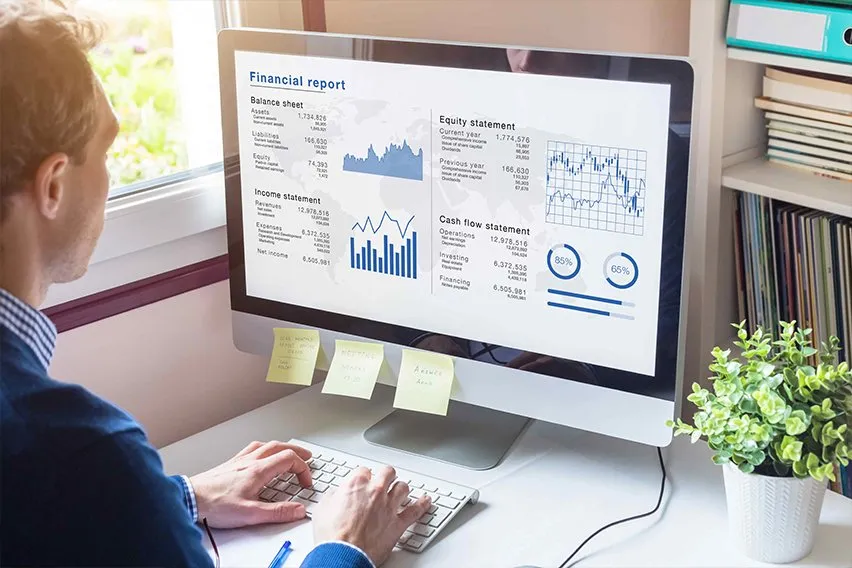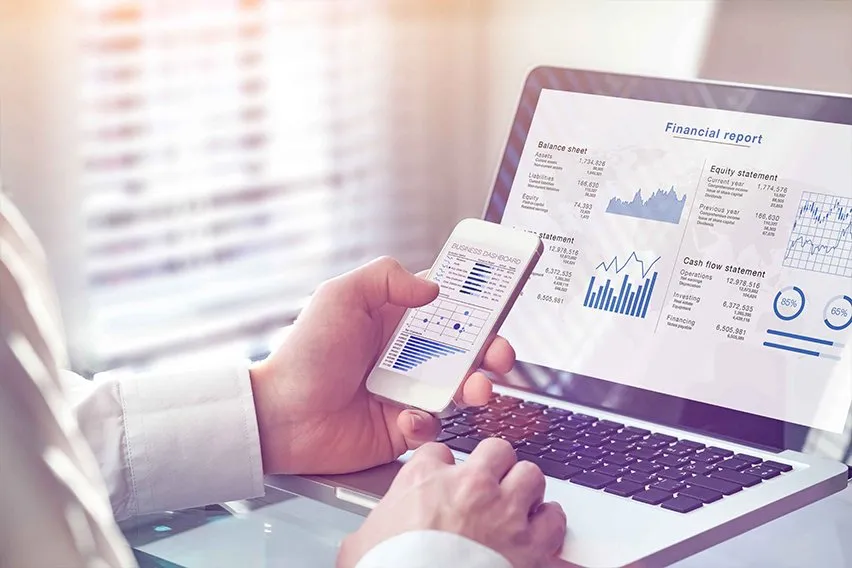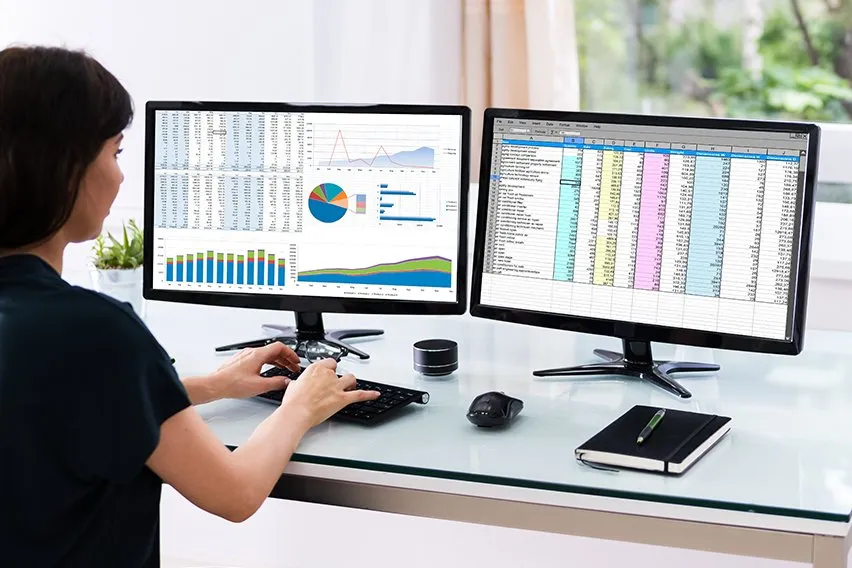10 Best Financial Software (Personal and Business) for 2025

When it comes to managing business accounting, manual processes are no longer the industry standard. Instead, desktop software and cloud-based tools are the keys to financial success.
Since the choices can be overwhelming, we’ve narrowed down the best financial data software options for you. In this post, discover 10 tools that help with expense tracking, budgeting, cash flow, and more.
Table of Contents
- FreshBooks
- Quicken
- YNAB
- Moneydance
- Banktivity
- Qapital
- Mint
- Personal Capital
- Tiller
- Sage Intacct
- Advantages of Using Personal Finance Software
- Personal Finance Apps vs. Accounting Software
- How Does Personal Finance Software Work to Transform Your Finances?
- Conclusion

A quick internet search yields a substantial number of recommendations for the best personal finance software. While many of the choices are excellent choices for personal finance management, others are geared toward helping businesses manage operations and administrative processes.
The roundup below includes recommendations from each category (personal and business) in order to provide a wide-ranging view of top software programs.
1. FreshBooks
FreshBooks is among the best options for small business accounting. It’s trusted by over 30 million users worldwide and has impressive customer reviews and support features. With intuitive functionality and powerful integrations, FreshBooks is designed to help all kinds of small business owners, including:
- Freelancers
- Self-employed professionals
- Small businesses with employees
- Businesses with contractors
You can connect your Freshbooks accounting software to your business bank bank and credit card to automatically track business expenses. FreshBooks also offers a mobile app so you can track mileage, create invoices, scan receipts, review accounts receivable, and handle other business transactions on the go.
FreshBooks supports double-entry accounting and has plenty of reporting features to help small business owners with money management and preparing for tax season.
According to G2’s in-depth review of FreshBooks, this small business accounting software gets excellent ratings for ease of use, quality of support, and ease of setup.
FreshBooks isn’t free software, but it offers a 30-day free trial to help you find the right plan for your small business. Pricing starts at $21.00/month for the Lite plan, $38.00/month for Plus, and $65.00/month for Premium. Custom plans are available upon consultation.
2. Quicken
Quicken is a leader in personal finance software. This software is available for Windows and Mac, and it allows users to create a central hub for tracking their day-to-day spending in one place.
With Quicken, you can create a monthly budget and track all your accounts to compare your budget to actual results. Quicken connects to your bank accounts and credit card accounts to track spending automatically.
Quicken offers free customer support, core software updates, and 5 GB of free online storage through Dropbox. Customers also get to see their credit scores each quarter.
Quicken doesn’t offer a free trial, but if you’re not happy with its personal finance features, they offer a 30-day money-back guarantee. After that, they charge a monthly fee starting at $3.99 (when billed annually).
Also, Quicken doesn’t offer a mobile app, but you can download its partner app, Simplifi, to get access to expense tracking tools that help you manage your financial life from anywhere.
3. YNAB
The goal of YNAB is to help users break free of the “paycheck to paycheck” cycle. YNAB is a personal budgeting tool that encourages users to overcome debt, save money, budget ahead, and establish categories that suit each individual’s lifestyle. YNAB is also known for its engaging classes, friendly culture, and budgeting education.
You can get a 34-day free trial of YNAB to see if it has the personal finance features you’re looking for.
4. Moneydance
Moneydance is personal finance software that offers online banking and bill pay features, budgeting tools, and investment tracking.
You can get an overview of your personal finances on a detailed money dashboard or use Moneydance’s graphing tool to generate visual reports to help you better manage finances.
Moneydance also supports multiple currencies, so it’s a good choice for people who own investments or earn income in other countries.
Moneydance doesn’t offer a free trial, but they do have a 90-day money-back guarantee if you’re not happy with its key features.
5. Banktivity
Banktivity is a personal finance software platform that prides itself on being more advanced and intuitive than Quicken. New users turn to Banktivity for help with things like:
- Asset management
- Calculation of gains and losses
- Management of credit card accounts
Banktivity is known for being incredibly comprehensive, organized, and cloud-based. You can connect your account to your financial institution, so Banktivity can track where you spend money and help you reach your financial goals.
Banktivity doesn’t offer online tools or a mobile app—you have to download the software to your laptop or desktop computer. However, they do offer a 30-day free trial.
6. Qapital
Qapital is an app-based service focused on making mobile banking easier and more streamlined. The app offers a science-based system that allows individual users and couples to set goals, track behaviors, and invest with the big picture in mind. Qapital’s Payday Divvy tool is an automatic feature that handles each incoming paycheck according to goals, preferences, and guilt-free spending needs.
Qapital doesn’t offer a free version, but accessing the basic features costs just $3 per month, and they offer a 30-day free trial.
7. Mint
Mint, a subsidiary of Intuit, is a free personal finance software app that allows users to gain insights into their complete financial picture. It tracks all your financial accounts, including bank accounts, investment tracking, retirement accounts, and even assets like your home and vehicle.
Mint also offers daily credit monitoring on your money dashboard to help with reaching your financial goals.
As the number one most downloaded personal finance app, it has an active community and plenty of helpful resources for getting started.
8. Personal Capital
Personal Capital is a wealth management platform and tracking tool for users who want clarity about their net worth. This personal finance software platform includes a dashboard for viewing an investment portfolio, a dynamic retirement planner, and a fee analyzer. Personal Capital is backed by top security features and encryption to give users peace of mind and protection.
Personal Capital’s free tools include net worth tracking, a savings planner, setting a monthly budget, and tracking cash flow.
9. Tiller
For spreadsheet junkies, Tiller is the best personal finance software for you. Tiller reduces the stress of managing multiple spreadsheets for personal finance planning. With automatic bank feeds, flexible spreadsheet templates, and email notifications, it’s easy to view and track the flow of money on a daily basis.
Tiller doesn’t offer any free tools, but they do have a 30-day free trial.
10. Sage Intacct
Sage Intacct is a business-focused accounting software platform that’s perfectly suited to a variety of industries and organizations. Sage offers a more diverse range of products than many personal finance platforms do. These features include Core Financial products (Accounts Payable, Receivable, and Cash Management) and Advanced Functionality (Revenue, Analytics, and Taxation).
Sage Intacct doesn’t offer a free version of its accounting software and pricing information isn’t available online. You have to share your contact information to request pricing.

Advantages of Using Personal Finance Software
Many of us require a helping hand with our personal finances. The constantly moving pieces are difficult to maintain without some level of automation.
Using software has a few key advantages:
- Financial services let you track financial habits more accurately by connecting to your bank account.
- Automated software makes processes like payroll incredibly easy.
- You can keep tabs on expense management, savings goals, and investment accounts.
- Your finance team can catch mistakes before they lead to major consequences.
Personal Finance Apps vs. Accounting Software
Personal finance software is helpful for a variety of purposes, but it’s important to know what your true goals are before you make the switch. For example, if you simply want to get a better handle on excess personal spending, choose a personal finance software platform that focuses on personal habit tracking and budgeting.
On the other hand, if you require more advanced features in order to run a growing business, you may need to look for accounting software or financial reporting software that offer support specifically to business owners and entrepreneurs. Accounting software features such as invoicing, bill pay, cash flow monitoring, and financial reports are essential for business use.
Regardless of whether you’re implementing personal finance software or accounting software for your small business, always ensure that the platform is secure. Data privacy, particularly when it comes to financial records, is crucial.
How Does Personal Finance Software Work to Transform Your Finances?
Personal finance software can truly change the course of your business for the better. Swapping manual financial records for intuitive personal finance software is transformational for the following reasons.
- It’s extremely convenient. Remove the hassle of paper receipts, checks, and manual records. Accounting software with bank syncing can connect to your bank accounts and track spending automatically so all of your financial information is in one place.
- It’s reliable. Historical data provides a record of your transaction history and account balances so that you don’t have to second guess what happened or where your money went.
- It boosts productivity. By empowering yourself and your employees with the right personal finance apps, you can focus on the financial goals and activities that really matter. Rest assured that your financial records are taken care of.
Conclusion
With an increasing number of options available for personal finance software and accounting apps. the perfect fit for your personal and business needs is out there. Test the waters with free trials and always research reviews and comparisons to make the best personal finance software choice for your particular needs. When in doubt, consult a qualified financial advisor or bookkeeping specialist.
Reviewed by
Janet Berry-Johnson, CPA, is a freelance writer with over a decade of experience working on both the tax and audit sides of an accounting firm. She’s passionate about helping people make sense of complicated tax and accounting topics. Her work has appeared in Business Insider, Forbes, and The New York Times, and on LendingTree, Credit Karma, and Discover, among others. You can learn more about her work at jberryjohnson.com.
RELATED ARTICLES


 9 Best Account Management Software and Tools
9 Best Account Management Software and Tools What is the Net Cash Flow Formula & How To Calculate It?
What is the Net Cash Flow Formula & How To Calculate It? 7 Free Online Bookkeeping Courses with Certificates in 2025
7 Free Online Bookkeeping Courses with Certificates in 2025 Levered Free Cash Flow (LFCF): Definition & Calculation
Levered Free Cash Flow (LFCF): Definition & Calculation Marginal Revenue: What It Is & How to Calculate It?
Marginal Revenue: What It Is & How to Calculate It? Best Desktop Payroll Software for Small Business
Best Desktop Payroll Software for Small Business